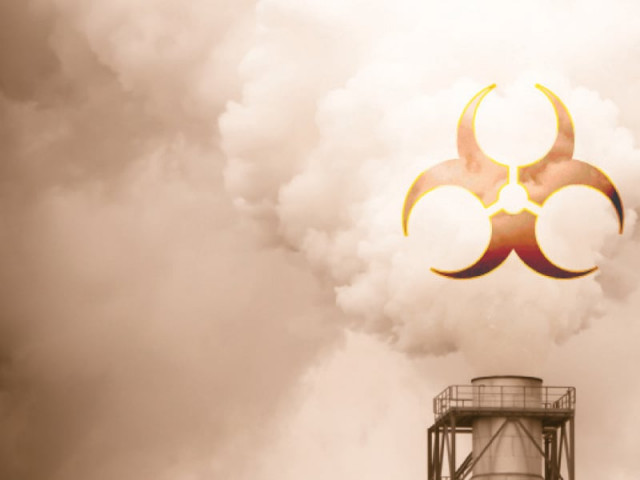Toxic emissions: Alternative factory fuels causing respiratory disease
Many factories continue to emit untreated smoke despite warnings from the Environment Protection Agency.

Ever since gas supply to industries has become irregular, an increasing number of factories have begun using rice husk, corn cobs and mustard husk as cheap alternatives to run the furnaces.
Around 30 complaints were received from workers and people living near factories in the city over the last two months, an Environment Protection Agency (EPA) official requesting anonymity told The Express Tribune.
Ever since gas supply to industries has become irregular, an increasing number of factories have begun using rice husk, corn cobs and mustard husk as cheap alternatives to run the furnaces.
Rizwan, a worker living close to the factory he works at on Defence Road, says he has filed several complaints about the high carbon soot emitted by the factory chimneys to the Environment Protection Agency (EPA).
Nearly 1,000 workers at the factory have contracted eye infection and respiratory disease, he said. Several workers have reported the problem to the EPA.
When Descon Engineering Metalics Manufacturing Manager Captain Ghulam Mustafa was contacted about the matter, he refused to comment.
The first such complaint was filed in 2007. Rizwan says the EPA has been checking smoke emissions from these factories. However, he says, the factory he works at has not stopped using rice husk as a replacement for furnace oil.
“Inspectors from the EPA carry out inspections, issue warnings and sometimes an environment protection order. The factory’s administration stops using rice husk and corn cobs for a few days, but after a while they switch back to these,” Rizwan said.
As many as 200 factories in the city, particularly textile and paper factories have been using rice husk, corn cobs and mustard husk in the place of gas and furnace oil. These fuels emit high levels of ash particles and dust that cause respiratory disease in workers and people living near the factories.
The EPA official said most of the factories using the alternative fuels were situated along the Defence Road, Hadiara Drain, and Sunder and Quaid-i-Azam Industrial Estates.
The people working in these factories and those living near them often complained about their clothes and houses being covered in soot, he said. If scrubbers were installed, he said they would wash down the ash (thus reducing air pollution) but the factories would likely dump their waste water exceeding safe bio-chemical oxygen demand (BOD) and chemical oxygen demand (COD) standards untreated into the River Ravi.
The Ringelmann scale, used to measure the apparent density of smoke on a scale of zero (white) to five (black), gives a reading of five factories burning rice husk. This is even higher than rubber tyres and furnace oil that give readings between two and four, the official said. “This is a big problem and will only get bigger unless concerted efforts are taken to solve it.”
Availability of the bio-fuels varies seasonally. Rice husk is not available nowadays so mustard husk and wheat husk are being used instead. Shah Kaan Textiles General Administrator Muhammad Ajaz says the factory has been using alternative fuel for two years “because of the gas shortage”. The EPA inspected the factory following complaints of high smoke emissions and told the owners to install electrostatic precipitators (ECPs) and cyclones that wash down the ash.
Ajaz says the factory has upgraded its boiler and installed one with a higher capacity. Around 2,400 maunds of husk are now used daily. In 2013, the price for a maund of rice husk went up from Rs300 to Rs550, the price for mustard husk from Rs150 to Rs310 and corn cobs up to Rs450. A tonne of these bio-fuels, he said, could cost between Rs2,200 and Rs2,500. Furnace oil, a cleaner alternative fuel, costs Rs5,000 per tonne and gas costs up to Rs1,450 per tonne, said Ajaz.
Most of these bio-fuels are brought by farmers from Dipalpur and Mian Channu in southern Punjab to the industrial zones in Lahore, Sialkot and Sheikhupura, he said.
A factory worker says rice husk is considered the most efficient bio-fuel followed by corn cobs and mustard husk.
Deputy Environment District Officer Younas Zahid says there is no harm in using rice or mustard husk or corn cobs as long as the factories use scrubbers to prevent ash particles from escaping into the air.
However, he says, these scrubbers use electricity, the cost of which factory owners are reluctant to bear. He says Shah Kaan Textiles were issued warnings and have since installed electrostatic precipitators.
“We realise there is a shortage of clean fuels. We advise factories, that use husk, to install and operate scrubbers,” Zahid says.
Published in The Express Tribune, April 25th, 2013.


















COMMENTS
Comments are moderated and generally will be posted if they are on-topic and not abusive.
For more information, please see our Comments FAQ